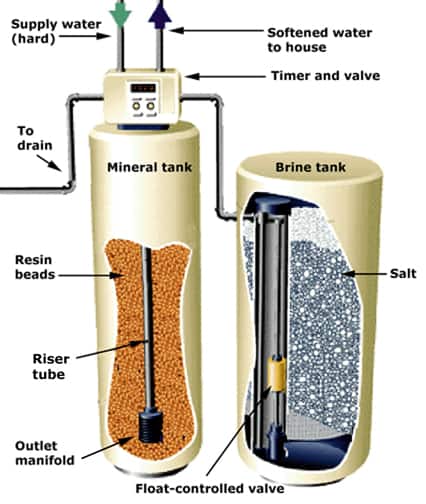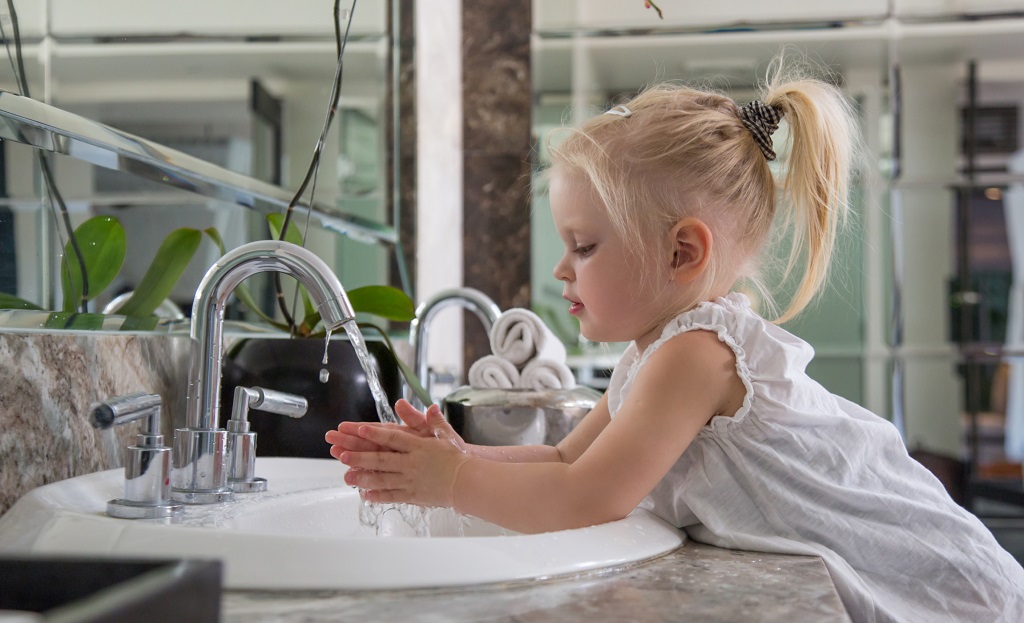Choosing a water softener system can be very confusing if you do not understand the basics. Here’s what you need to know to find a system well-suited for your household water usage.
Experiencing the negative impact of hard water in your household is a common annoyance for many people in locations throughout the United States. You are reminded of it when cleaning your home, doing laundry, or just feeling dry, itchy skin after a shower or bath.
Fortunately, whole-house water softener systems can make a major difference in the quality of the water that runs through your plumbing, expensive appliances and fixtures.
Choosing a water softening system, however, can be very confusing if you do not understand the basics. Here’s what you need to know to find a system well-suited for your household water usage.
Table of Contents
- The Signs and Dangers of Hard Water
- What is a Water Softener System?
- Benefits of a Water Softener System
- How a Water Softener System Works
- How to Choose a Water Softener System
- Leading Brands & Models of Water Softener System
- Hard Water & Water Softener Resources
Also see:
The Signs and Dangers of Hard Water
Calcium and other mineral deposits found naturally in your water supply can cause damage to pipes, appliances, fabric, skin and hair. The dull, dinginess you may see in light-colored clothing or the streaks of grey on dark garments is most likely the result of various minerals in your water reacting with laundry soaps and detergents, causing the cleaning agents to become less effective.
Spots on glassware, dishes, silverware and inside coffee pots are also evidence of water hardness or mineral deposits. A decrease in water flow or hard calcium scale on faucet heads, drains, showerheads, bathtubs and toilets are all a sure sign of water hardness.
This deposit or mineral excess can have a detrimental effect on appliances and piping by reducing water flow through occlusion, thereby shortening the overall lifespan of these items.
An effective way to combat the negative effects of hard water is to install a full-house water softener system.
Testing your incoming water supply to determine the exact hardness level of your household water is the first step to determining how to choose the correct water softener system for your home.
What is a Water Softener System?
Water softener systems are devices designed to reduce the amount of minerals and metals and subsequent scale deposits in your home’s internal water system. These natural elements and compounds, such as magnesium, iron and calcium, are picked up through the soils and rocks, as rainwater travels through aquifers and eventually into the public water supply. Although not harmful to ingest, hard water can have other devastating effects causing plumbing issues, appliance breakdown, and irritating conditions to hair and skin.
- 85% of US Households have hard water – USGS
- Only 30% of these households have a water softener system! – Marmon Water
Benefits of a Water Softener System
A quality water softener system that is well-suited for your specific needs (e.g. water source type, water hardness, water usage, etc.) can provide many of the following benefits:
- Prolonged life span of household fixtures, appliances and plumbing
- Lower energy costs due to appliances performing more efficiently
- Softer laundry and improved cleanliness
- Improved hygiene and softness of hair and skin
- Increased property value
- Fewer spotty dishes
- Reduced time doing household cleaning
How a Water Softener System Works
The basic idea behind a water softener system is to reduce the mineral and metal content of hard water by filtering out the hard elements through the process of “cation exchange“. Simply stated, the concept is to substitute one ion, say magnesium, for another ion, salt or sodium chloride, to condition the water or make it softer.
Water softener systems are filled with electro-statistically sensitive resin beads that have sodium or potassium attached and are sensitive to mineral or metal “cations”, such as magnesium, iron or calcium. The “exchange” takes place when the resin beads release their negative sodium or potassium ion in exchange for the positive magnesium or calcium ion found in hard water.

Image courtesy of HomeTips
With its new positive ion partner attached, the beads allow softer or negatively ionized water to pass through the softener or mineral tank. This newly conditioned water is then distributed throughout the house via the cold-water supply.
Resin Bead Rejuvenation
The resin beads, which are now saturated with hard minerals and metals, are eventually regenerated in the system through a brine, or salt, solution wash. This process causes the resin beads to release the hard deposits in exchange for sodium chloride or salt, to rejuvenate them to start the process all over again. The hard deposits wash down and away from the home’s sewer system.
Kinetico – How a Water Softener Works
How to Choose a Water Softener System
Before looking at various brands of water softening systems it is important to have two metrics clearly defined for the proper sizing of a solution that will meet your efficiency goals and household water needs. Knowing the correct measure of hardness of your water, or GPG (Grains Per Gallon), and your household daily water usage will insure the right fit from both an economical and practical perspective.
Two Key Metrics to Know Upfront:
- The Hardness of Your Water in GPG (Grains Per Gallon)
- Average Household Water Usage (Daily or Monthly)
Key Steps to Choosing a Water Softener Systems
- How Do You Know If You Have Hard Water?
- How to Determine Your Water Hardness or GPG
- How to Calculate Your Household’s Daily Water Usage
- How to Size Your Water Softening System
- How Many Grains do You Need?
- Grains Per Pound of Salt Efficiency
- Other Features to Consider
How Do You Know If You Have Hard Water?
A quick in-home test for water hardness can be performed by filling a clear, clean empty bottle with a combination of pure liquid soap and tap water. First, fill the bottle halfway with tap water, then add a few drops of liquid dish soap. Then cap the bottle and shake it vigorously for half a minute. If there is a distinct lack of bubbles in the bottle, and the water appears cloudy, you have confirmed that the tap water is hard.
How to Determine Your Water Hardness or GPG
To determine the degree of hardness of your internal water supply, you can simply check your area, using your zip code, on the Aquasure water hardness database and take note of your location’s PPM number.
Water particulates are measured in parts per million or PPM or how many particles of sediment are dissolved in water per million particles. This PPM level is further classified into a “Grains per Gallon” or GPG rating which is the “measure of hardness” – one grain of calcium, at 65 milligrams, dissolved in a liter of water.
GPG is equivalent to 17.14 PPM’s (parts per million), thus if you know the PPM value, simply divide this number by 17.14 to get the measure of hardness in GPG:
- 50 PPM = 2.917 GPG
- 50 PPM / 17.14 GPG = 2.917 GPG
When reviewing various water softener systems, it may be necessary to have both PPM and GPG numbers, as different manufacturers use either one measurement or the other.
However, if you know either the actual PPM or GPG number for your household water, you can determine the hardness level of your home’s tap water by using the table below:
| PPM | WATER HARDNESS |
| 0 – 50 PPM 0 – 2.917 GPG |
Is soft. |
| 51 – 100 PPM 2.975 – 5.835 GPG |
Is moderately soft. |
| 101 – 150 PPM 5.893 – 8.752 GPG |
Is slightly hard. |
| 151 – 200 PPM 8.811 – 11.670 GPG |
Is moderately hard. |
| 201 – 275 PPM 11.728 – 16.046 GPG |
Is hard. |
| 276 – 350 PPM 16.104 – 20.422 GPG |
Is very hard. |
| 350+ PPM 20.422+ GPG |
Is aggressively hard. |
If your water hardness test reveals a 7.5 GPG or higher – hard water is considered to be a solution greater than 7.5 GPG – you will benefit from installing a water softener system in your home to offset the natural deposits in your municipal or well water supply. Once you’ve determined that the water coming onto your home is indeed 7.5 GPG or greater, you need to determine which size of water softener system is right for your particular needs.
How to Calculate Your Household’s Daily Water Usage
Determining your family’s water usage is extremely important in order to size the right system for your household daily use. The more people living in your home, the more water softening capacity you will need in order to accommodate daily water needs. The easiest way to derive this number is to check previous water bills for the past year and take an average monthly figure.
A quick rule of thumb is that the average person uses 12-15 cubic meters or between 3,000 to 4,000 US gallons of water per month. This equates to a daily average of 100 to 133 gallons per person.
Note: One US gallon equals 0.00378541 cubic meters of water.
How to Size Your Water Softening System
Your Grain Per Gallon (GPG) Number: 12 – we have hard water in Southern California
Gallons of Water Per Day Household Usage: 2 people X 133 gallons per day each = 266 – includes lawn care, laundry, etc.
Recommended Number of Days Worth of Water Before Next Rejuvenation = 7 days or 1 week of water in tank
The calculation for sizing your water softener system is as follows:
12 GPG X 266 Daily Gallons X 7 Days of Available Water = 22,344 grain capacity needed
Using the GPG and daily household water usage figures above, we would need a 24,000-grain capacity water softener system – an amount safely greater that our estimated 7-day water usage.
How Many Grains do You Need?
Water softener systems are sold by the number of grains of hardness they can remove before they need to be regenerated. Descriptions for 24,000 / 32,000 / 48,000 / 64,000 grain water softeners represent the full capacity for water hardness removal that a system can perform before the resin beads need to be rejuvenated.
The larger the number, the larger the system. The greater your water usage, the larger your grain number should be. In other words, a 64,000-grain water softener can remove 64,000 grains of hardness before it must enter the rejuvenation cycle.
Just a word of caution about these figures: the specifications of 24,000 / 32,000 / 48,000 / 64,000 grains are theoretical numbers based on 1 cubic foot of resin beads under controlled, ideal laboratory conditions. However, the actual numbers in real world usage are likely around 94% of these numbers 22,500 / 30,000/ 45000/ 60,000 grains respectively. Make sure to account for this fact when calculating your usage for system sizing.
Grains Per Pound of Salt Efficiency
Understanding a water softener’s salt efficiency is key to its stated Grains Per Pound of salt rating (gr/lb) or how many pounds of salt will be required for the full capacity of the system to be regenerated.
If the system is not rejuvenated correctly, or if you are rejuvenating the system too often, this will lead to system malfunction, more hard water entering your household and increases in annual salt consumption, energy costs and total cost of ownership.
It is important to understand another measure of capacity – that of salt usage – required for full capacity regeneration to occur. The salt efficiency of some systems being sold should be stated in Grains Per Pound of Salt. For example a 24,000 grain system with an efficiency of 4,000 Grains Per Pound, would require 6 pounds of salt per regeneration cycle – i.e. 24,000/4,000 = 6 pounds of salt.
Sizing a softener and considering its salt efficiency will ensure you purchase a softener that never runs out of soft water, but also uses the least amount of salt as possible. Over the life span of the water softener, this translates to significant cost savings and ease of ownership.
Other Features to Consider
- Energy Efficiency
- Iron Removal
- Contaminant Filtration Capabilities
- Regeneration Method: Automatic, Metered
- Water Usage Metrics
Leading Water Softener Systems
- Fleck
- Kenmore
- Rheem
- WaterBoss
- Whirlpool
- Additional Water Softener System Brands
- Whole House Water Filtration Systems
Fleck 5600 SXT On-Demand Water Softener
Fleck touts that its 5600 model is the most popular water softener control valve on the planet! This version comes in a rigid Noryl valve body and consumes less power. It was updated from the old mechanical-meter to the modern, yet intuitive SXT electronics.
Key features include:
- Easy to install, set and operate
- Display shows the time of day and gallons of soft water remaining
- Has only one internal moving part in the water stream
- Comes with a 5-year valve warranty and 10-year tank warranty
- Offers 4 modes of operation:
- Immediate Meter Regeneration
- Delayed Meter Regeneration
- Delayed Time Clock Regeneration, or
- Day of Week Regeneration
- Comes in the following sizes:
- 26,000 Grains, 7 Gallons per Minute (GPM)
- 35,000 Grains, 10 GPM
- 53,000 Grains, 15 GPM
- 70,000 Grains, 20 GPM
Also see:
Kenmore 350
The Kenmore 350 32,000 Grain Water Softener is well-suited for households with 1 to 4 persons looking for a highly reliable system that is easy to maintain. This model is also a compatible replacement for many previous Kenmore models.
Besides having a highly reliable track record, Kenmore has developed its IntelliSoft® technology, an attractive feature for prescriptive maintenance, which automatically keeps track of water usage over time and proactively regenerates water. This technology increases the efficient usage of salt and water, which helps you save money on energy, salt and water costs.
Kenmore Water Softener Installation
Rheem
Rheem is a trusted brand that has been in existence since 1925, as a pioneer in innovative solutions for heating, cooling, water heating and now, water softening products. With built-in Rheem Learning Technology that learns a household’s usage patterns, Rheem’s softener systems help reduce salt, water and energy consumption, while still providing softer water on-demand for the entire home.
The Preferred Series of Rheem Water Softeners is available in both 32,000 and 42,000 grain capacity with the latter available in a Wi-Fi-enabled model. There’s no need to set schedules for weekly system rejuvenation, as Rheem Preferred softeners use advanced artificial intelligence that optimizes your salt and soft water usage automatically.
Features of the Preferred Series models include:
- WiFi Enabled
- Water Management System & Alerts via Free App
- Rheem Learning Technology
- Built-in, Self-Cleaning Sediment Filter
- Low Salt Monitor
- Ultra-High Flow Valve
- Remote Water Shut-Off Option
- Illuminated Tank Light
- Comprehensive Warranty: 1-year on parts and labor (extendable to 5-years); 3-years on electronics; and 10-years on the tanks
Rheem Preferred Series Water Softeners
WaterBoss
Made in the USA, each Waterboss Water Softener System undergoes a full system test prior to shipment to customers, insuring reliability and operational performance. WaterBoss systems use less water and salt than other products, a result of employing a fine mesh resin system in the mineral tank.
Backed by a 10-year limited warranty, WaterBoss products are supported by live customer support staff from their offices in Ohio. Originally part of the Ohio-based water softener company, William R. Hague, Inc., WaterBoss is now owned by AO Smith of Milwaukee, an American manufacturer of both residential and commercial water heaters, boilers and water treatment products in North America.
All of their models include the following features & benefits:
- Dirt & sediment filter
- Built-in self-cleaning filter
- Solve most common household needs
Also see:
- WaterBoss 950 City Water 22,000 Grain Capacity
- WaterBoss 900 High-Usage 36,400 Grain Capacity
- WaterBoss 700 High-Efficiency 22,000 Grain Capacity
Whirlpool WHES18 High-Efficiency Water Softener
Whirlpool’s WHES18 new compact water softener system is ideal for smaller households of 1 to 2 persons and is equipped with the latest smart technology for highly-efficient water softening. Designed with Demand Initiated Regeneration, this system only regenerates brine and water when it needs to, which will provide savings on energy and water usage. The technology learns your water usage patterns and automatically calculates the amount of salt and water needed when regenerating, making maintenance more convenient.
Key features include:
- 18,000 Grain Capacity
- Demand Initiated Regeneration
- Salt Saving Technology
- High Hardness Removal of a maximum of 65 GPG
- Connects to plumbing up to 1” in diameter
- Manufacturer’s warranty, 1-year parts, 3-year electronics, 10-year tanks
- High-flow valve maintains water pressure
- Do-It-Yourself Installation Kit
Also see:
Additional Water Softener System Brands
- Aquasure
- Crystal Quest
- EcoPure
- Eddy (Electronic Descaler)
- Evolve
- FilterSmart
- Fleck
- Genesis
- Kenmore
- Morton
- Puronics
- Rheem
- SoftPro
- SpringWell
- Whirlpool
- Yarna (Electronic Water Descaler)
Whole House Water Filtration Systems
Hard Water & Water Softener Resources
- EWG’s Tap Water Database (To Find Contaminants in Your Local Water Source)
- EWG’s Water Filter Guide
- NSF: National Sanitation Foundation
- Find NSF-Certified Products & Systems
- Rheem Hard Water Impact Guide
- US Water Systems Products by Water Problem
- USGS: Hardness of Water
- Water Quality Association (WQA)
- Find WQA-Certified Water Treatment Products
- Homewater101.com
- How Water Softeners Works
- Softener Efficiency: It’s Not Just About the Salt
- Which Cities Have the Hardest Water in America?
- Water Softener Terminology Explained
Additional Recommended Reading
- Non-Invasive Plumbing Tech for Repairing Your Home’s Sewer Line
- How to Choose a Water Leak Detection System for Your Home
- Improve Your Landscaping with a Smart Irrigation System
- Repiping Your House: Early Signs It Might Be Time To Repipe
| Purgula is reader-supported. When you click on links to other sites from our website, we may earn affiliate commissions, at no cost to you. If you find our content to be helpful, this is an easy way for you to support our mission. Thanks! Learn more. |







